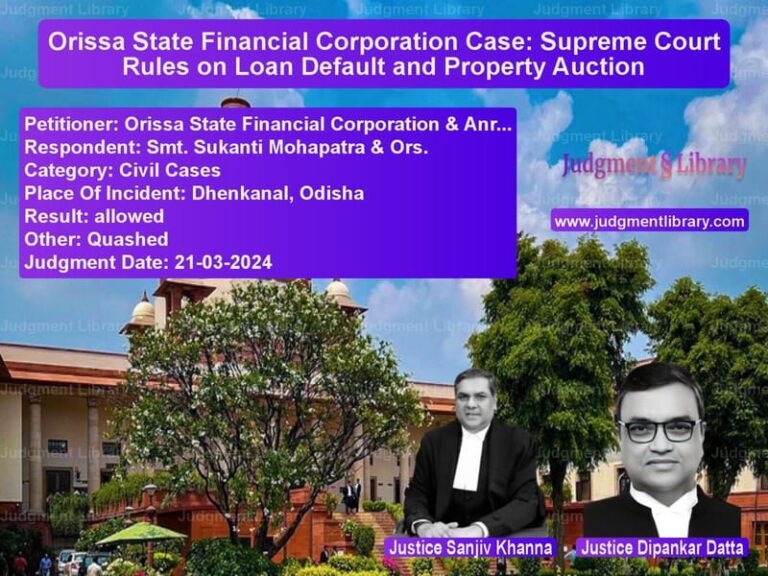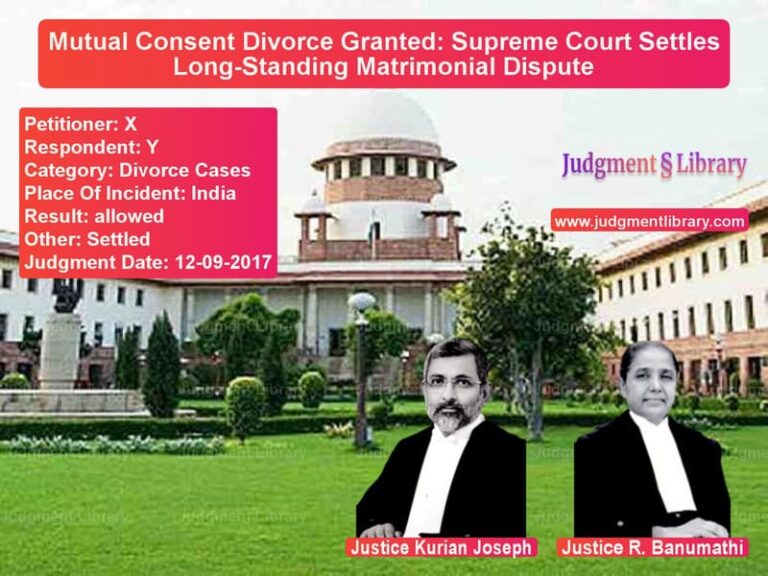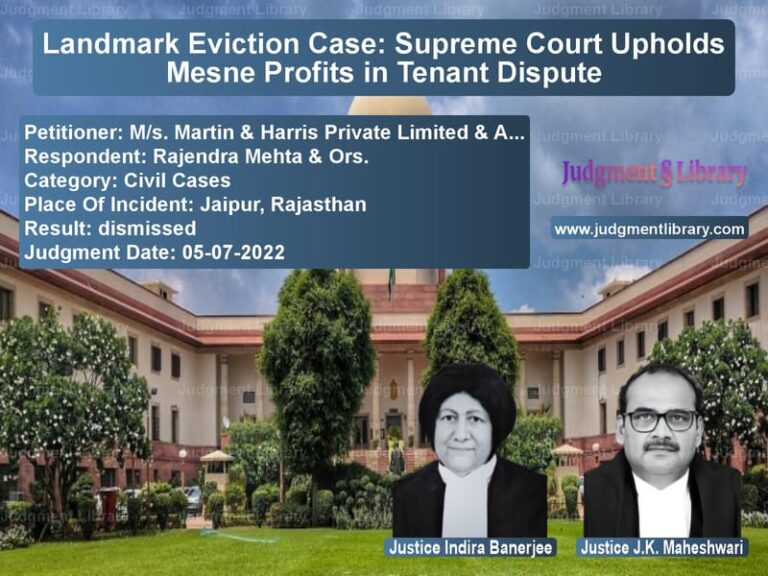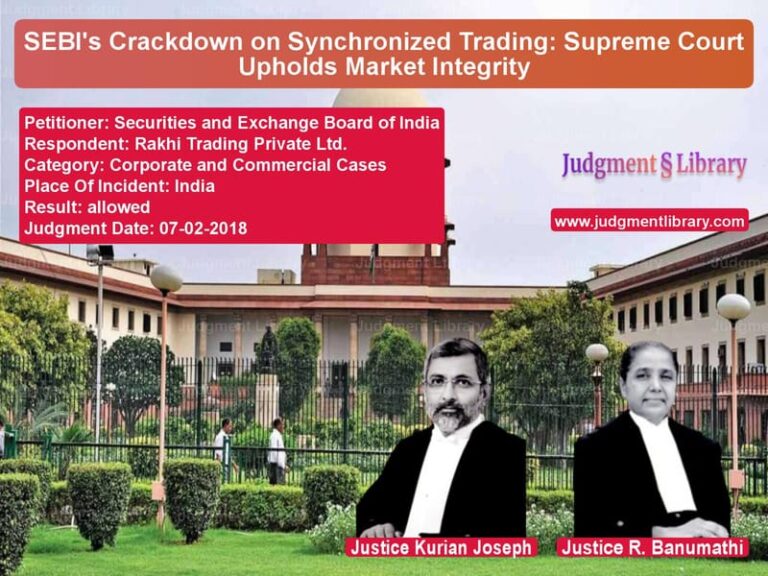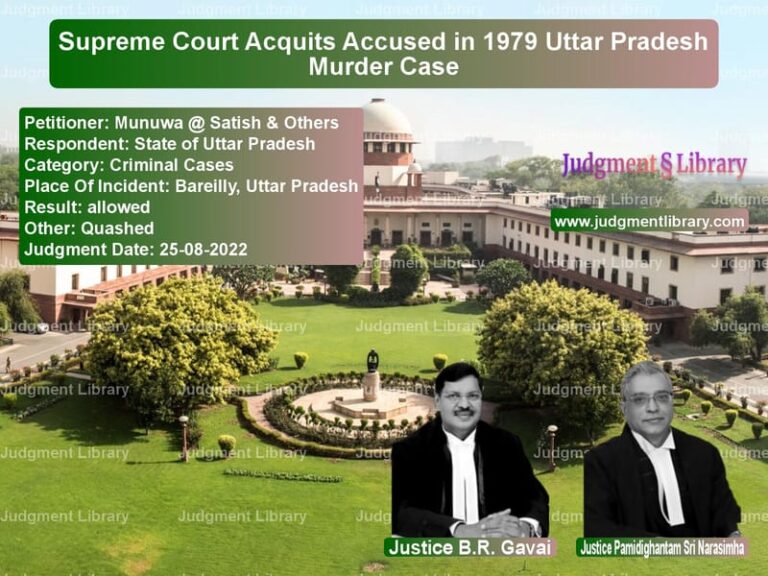Supreme Court Reinstates Corruption Probe Against Ex-Principal Secretary Aman Kumar Singh
The Supreme Court has reinstated a corruption investigation against Aman Kumar Singh, the former Principal Secretary to the Chief Minister of Chhattisgarh, overturning the Chhattisgarh High Court’s decision to quash an FIR. In the case of The State of Chhattisgarh & Anr. v. Aman Kumar Singh & Ors., the Court emphasized that corruption allegations must be thoroughly investigated and cannot be dismissed at an early stage based on procedural irregularities.
Background of the Case
The case arose from a complaint filed by Uchit Sharma on October 11, 2019, alleging that Aman Kumar Singh, his wife Yasmin Singh, and other family members were involved in corruption, money laundering, and amassing disproportionate assets. Following this complaint, the Chhattisgarh Chief Minister directed the Economic Offences Wing (EOW)/Anti-Corruption Bureau (ACB) to conduct an inquiry. This led to the registration of FIR No. 9/2020 on February 25, 2020, under Section 13(1)(b) and (2) of the Prevention of Corruption Act, 1988 and Section 120B of the Indian Penal Code.
The FIR accused Singh of acquiring assets vastly disproportionate to his known sources of income during his tenure as Principal Secretary. His wife, Yasmin Singh, had served as a consultant in the Chhattisgarh government, further raising questions about financial transactions linked to the family.
High Court Decision
Aman Kumar Singh and Yasmin Singh challenged the FIR before the Chhattisgarh High Court, arguing that the investigation was politically motivated. The High Court, in its judgment dated January 10, 2022, ruled in their favor, quashing the FIR and stating that it was based on probabilities rather than concrete evidence.
Petitioner’s Arguments (State of Chhattisgarh & Uchit Sharma)
The State of Chhattisgarh, represented by Advocate Kapil Sibal, argued:
- The FIR was filed based on preliminary inquiry findings, revealing disproportionate assets and questionable financial transactions.
- The High Court overstepped its jurisdiction by interfering at the investigation stage.
- As per CBI v. Tapan Kumar Singh (2003) 6 SCC 175, an FIR does not need to be an encyclopedia of evidence but only needs to disclose a cognizable offense.
- Singh had avoided joining the investigation despite notices, delaying the probe.
Respondent’s Arguments (Aman Kumar Singh & Yasmin Singh)
Represented by Senior Advocate Mahesh Jethmalani, the respondents contended:
- The FIR lacked specific details on disproportionate assets and merely speculated about financial irregularities.
- The political regime change in Chhattisgarh led to a vindictive probe against Singh.
- There was no “check period” mentioned in the FIR, making the allegations baseless.
- The Prevention of Corruption Act does not criminalize procedural lapses in asset disclosures.
Supreme Court’s Judgment
The Supreme Court bench, comprising Justices S. Ravindra Bhat and Dipankar Datta, ruled in favor of the State of Chhattisgarh, setting aside the High Court’s decision.
“Corruption is a cancer that threatens governance. The mere possibility of an accused being politically targeted does not justify quashing an FIR when allegations of disproportionate assets are substantiated by initial inquiry.”
The Court provided the following reasons:
- The FIR contained specific allegations of disproportionate assets, warranting further investigation.
- The High Court erred in applying an incorrect legal standard to assess the FIR’s validity.
- Whether Singh could satisfactorily explain his wealth was a matter of investigation, not for the High Court to decide prematurely.
- There was a need to allow law enforcement to complete their probe before any judicial interference.
Key Takeaways from the Judgment
For Corruption Investigations:
- Authorities must be allowed to complete investigations before courts evaluate the merits of allegations.
- FIRs in corruption cases need not establish guilt but must contain enough material for further inquiry.
For Judicial Oversight:
- Courts should exercise restraint in quashing FIRs, especially in cases of economic offenses and corruption.
- Political motivations behind an investigation do not automatically invalidate corruption allegations.
For Public Servants:
- Government officials must maintain transparent records of assets to avoid allegations of disproportionate wealth.
- Any suspicion of financial irregularities can lead to rigorous legal scrutiny.
Conclusion
The Supreme Court’s ruling in The State of Chhattisgarh & Anr. v. Aman Kumar Singh & Ors. reinforces the principle that corruption allegations require thorough investigation before judicial intervention. By allowing the case to proceed, the Court has underscored its commitment to accountability in public office. This judgment sets a precedent for handling corruption cases involving government officials, ensuring that legal scrutiny is not undermined by premature judicial interference.
Petitioner Name: The State of Chhattisgarh & Anr..Respondent Name: Aman Kumar Singh & Ors..Judgment By: Justice S. Ravindra Bhat, Justice Dipankar Datta.Place Of Incident: Chhattisgarh.Judgment Date: 28-02-2023.
Don’t miss out on the full details! Download the complete judgment in PDF format below and gain valuable insights instantly!
Download Judgment: the-state-of-chhatti-vs-aman-kumar-singh-&-o-supreme-court-of-india-judgment-dated-28-02-2023.pdf
Directly Download Judgment: Directly download this Judgment
See all petitions in Money Laundering Cases
See all petitions in Fraud and Forgery
See all petitions in Extortion and Blackmail
See all petitions in Judgment by S Ravindra Bhat
See all petitions in Judgment by Dipankar Datta
See all petitions in allowed
See all petitions in Remanded
See all petitions in supreme court of India judgments February 2023
See all petitions in 2023 judgments
See all posts in Criminal Cases Category
See all allowed petitions in Criminal Cases Category
See all Dismissed petitions in Criminal Cases Category
See all partially allowed petitions in Criminal Cases Category


